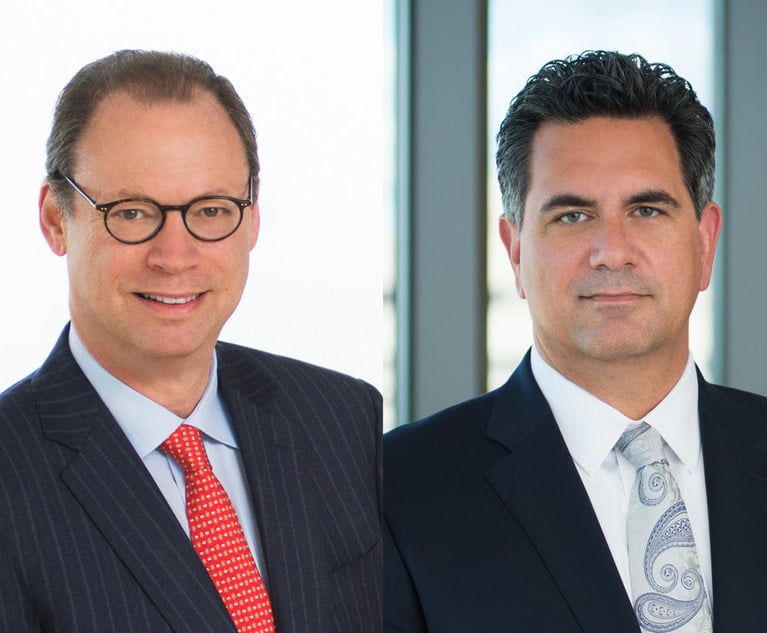Administrative Claim Is Not a Given or the Sole Remedy for Unpaid Post-Petition Rent Prior to Assumption or Rejection
The court performed an intensive factual review and legal analysis, and concluded that it had the authority to craft an equitable remedy that balanced the protections afforded commercial landlords under the Bankruptcy Code with the bankruptcy policy of promoting equality of distributions to all creditors. In the end, the court did grant an administrative claim but in a reduced amount.
July 05, 2024 at 12:42 PM
11 minute read
 Left to right: Andrew Kassner and Joseph Argentina, Drinker Biddle & Reath
Left to right: Andrew Kassner and Joseph Argentina, Drinker Biddle & Reath As we reported in this column in April, landlords often hold large claims in bankruptcy cases involving commercial real estate when the lease is rejected by the tenant debtor. In these cases, not only are rejection claims unsecured and capped, but, as all unsecured creditors experience, often unsecured claims receive pennies on the dollar. However, the Bankruptcy Code is better for landlords regarding the debtor's lease obligations that arise after the bankruptcy filing until the lease is rejected. The Bankruptcy Code provides that trustees and debtors-in-possession are required to perform all post-petition obligations arising under nonresidential leases, and their failure to do so can be treated as administrative claims, which are paid in full ahead of unsecured claims. That being said, courts disagree on whether these post-petition lease claims automatically result in a per se administrative expense claim for unpaid rent and other lease charges. Given that administrative claims are paid in full before unsecured claims, courts scrutinize administrative expense requests carefully.
This issue was recently addressed by the U.S. Bankruptcy Court for the District of New Jersey in In re Jughandle Brewing, Case No. 23-15703 (CMG) (June 3, 2024). In that case, the court concluded allowance of an administrative expense claim is not automatic and also may not be the sole remedy for a debtor or trustee's failure to perform its post-petition obligations under a commercial lease. The court performed an intensive factual review and legal analysis, and concluded that it had the authority to craft an equitable remedy that balanced the protections afforded commercial landlords under the Bankruptcy Code with the bankruptcy policy of promoting equality of distributions to all creditors. In the end, the court did grant an administrative claim but in a reduced amount.
This content has been archived. It is available through our partners, LexisNexis® and Bloomberg Law.
To view this content, please continue to their sites.
Not a Lexis Subscriber?
Subscribe Now
Not a Bloomberg Law Subscriber?
Subscribe Now
NOT FOR REPRINT
© 2025 ALM Global, LLC, All Rights Reserved. Request academic re-use from www.copyright.com. All other uses, submit a request to [email protected]. For more information visit Asset & Logo Licensing.
You Might Like
View All
'In Re King': One Is Definitely the Loneliest Number When Filing an Involuntary Petition
7 minute read
Delaying Rent Payment by Assisted Living and Skilled Nursing Facilities in Chapter 11
7 minute read
Debtor-Owner Allowed to Modify Mortgage in Bankruptcy Even if Debtor Is Not Obligor Under the Mortgage Loan
7 minute readLaw Firms Mentioned
Trending Stories
- 1Settlement Allows Spouses of U.S. Citizens to Reopen Removal Proceedings
- 2CFPB Resolves Flurry of Enforcement Actions in Biden's Final Week
- 3Judge Orders SoCal Edison to Preserve Evidence Relating to Los Angeles Wildfires
- 4Legal Community Luminaries Honored at New York State Bar Association’s Annual Meeting
- 5The Week in Data Jan. 21: A Look at Legal Industry Trends by the Numbers
Who Got The Work
J. Brugh Lower of Gibbons has entered an appearance for industrial equipment supplier Devco Corporation in a pending trademark infringement lawsuit. The suit, accusing the defendant of selling knock-off Graco products, was filed Dec. 18 in New Jersey District Court by Rivkin Radler on behalf of Graco Inc. and Graco Minnesota. The case, assigned to U.S. District Judge Zahid N. Quraishi, is 3:24-cv-11294, Graco Inc. et al v. Devco Corporation.
Who Got The Work
Rebecca Maller-Stein and Kent A. Yalowitz of Arnold & Porter Kaye Scholer have entered their appearances for Hanaco Venture Capital and its executives, Lior Prosor and David Frankel, in a pending securities lawsuit. The action, filed on Dec. 24 in New York Southern District Court by Zell, Aron & Co. on behalf of Goldeneye Advisors, accuses the defendants of negligently and fraudulently managing the plaintiff's $1 million investment. The case, assigned to U.S. District Judge Vernon S. Broderick, is 1:24-cv-09918, Goldeneye Advisors, LLC v. Hanaco Venture Capital, Ltd. et al.
Who Got The Work
Attorneys from A&O Shearman has stepped in as defense counsel for Toronto-Dominion Bank and other defendants in a pending securities class action. The suit, filed Dec. 11 in New York Southern District Court by Bleichmar Fonti & Auld, accuses the defendants of concealing the bank's 'pervasive' deficiencies in regards to its compliance with the Bank Secrecy Act and the quality of its anti-money laundering controls. The case, assigned to U.S. District Judge Arun Subramanian, is 1:24-cv-09445, Gonzalez v. The Toronto-Dominion Bank et al.
Who Got The Work
Crown Castle International, a Pennsylvania company providing shared communications infrastructure, has turned to Luke D. Wolf of Gordon Rees Scully Mansukhani to fend off a pending breach-of-contract lawsuit. The court action, filed Nov. 25 in Michigan Eastern District Court by Hooper Hathaway PC on behalf of The Town Residences LLC, accuses Crown Castle of failing to transfer approximately $30,000 in utility payments from T-Mobile in breach of a roof-top lease and assignment agreement. The case, assigned to U.S. District Judge Susan K. Declercq, is 2:24-cv-13131, The Town Residences LLC v. T-Mobile US, Inc. et al.
Who Got The Work
Wilfred P. Coronato and Daniel M. Schwartz of McCarter & English have stepped in as defense counsel to Electrolux Home Products Inc. in a pending product liability lawsuit. The court action, filed Nov. 26 in New York Eastern District Court by Poulos Lopiccolo PC and Nagel Rice LLP on behalf of David Stern, alleges that the defendant's refrigerators’ drawers and shelving repeatedly break and fall apart within months after purchase. The case, assigned to U.S. District Judge Joan M. Azrack, is 2:24-cv-08204, Stern v. Electrolux Home Products, Inc.
Featured Firms
Law Offices of Gary Martin Hays & Associates, P.C.
(470) 294-1674
Law Offices of Mark E. Salomone
(857) 444-6468
Smith & Hassler
(713) 739-1250






